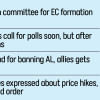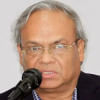Women in Politics: Barely visible
Some parties consider it achievable, some need more time to do so and there are many others who consider it a distant goal.
The Representation of the People Order (RPO) stipulates that each political party must have 33 percent women in their committees by 2020 to ensure wider participation of women in politics.
This target was set in 2008, when the law was amended to incorporate this provision.
The deadline ends in about three years, but women's participation in major political parties' central and grassroots committees is barely visible.
For instance, the ruling Awami League has only four women in its 17-strong Presidium Committee, a top policymaking body, while its archrival BNP's 19-member Standing Committee, its highest policymaking body, has only one woman -- the party chairperson.
There are only two women in AL's 40-member Advisory Council. The BNP has six women in its 73-strong advisory body.
Not a single of the eight AL organising secretaries is woman. The BNP has two out of the 10 in similar posts. One out of the four AL joint general secretaries is woman but there is no woman joint secretary general in the BNP (the party has eight such posts).
AL's 78-odd Central Working Committee has only 15 women members while BNP's 502-member National Executive Committee has 65.
This dismal picture was revealed after 33 out of the 40 registered political parties recently updated the Election Commission about the status of women representation in their parties.
On June 13, the EC sent letters to all the registered political parties, asking them to inform the Commission by July 10 about their progress in achieving the target -- 33 percent women representation by 2020.
The EC later extended the deadline to August 4, by which time 33 parties responded, explaining their current status and future plan in this regard.
The RPO, originally formulated in 1972, is the law that regulates political parties and electoral conducts.
Asked to comment on the progress, Chief Election Commissioner KM Nurul Huda said, “We have got response from some parties. We will evaluate the progress after we get response from all the parties.”
The EC prepared a report based on the response it received so far.
The report shows the AL has 19 percent women in its central committee against 13 percent women in BNP's national executive committee.
However, both the parties claimed to the EC that they had 15 percent women representation in different tiers.
Given the current status, it will be very difficult, if not impossible, for the parties to meet the target within the 2020 deadline.
In its response to the EC, Jatiya Party, the main opposition party in parliament, said women were less interested to be involved in active politics. So it is not possible to ensure 33 percent women in any level by any political party, including the JP.
Most of the parties, however, did not mention the progress they made so far.
Almost all the religion-based parties demanded extension of the deadline, saying women were not yet interested in active politics.
Left-leaning political parties also failed to show any good progress. For example, Jatiya Samajtantrik Dal (JSD) has 11.99 percent female members in its central committee and 8 percent to 10 percent in its district committees.
Bangladesher Samyabadi Dal, Bangladesher Samajtantrik Dal (BSD) and Bangladesh Biplobi Workers Party did not mention their progress.
The JSD demanded that the EC push the deadline to 2030.
Bangladesh Biplobi Workers Party said although it was difficult to ensure 33 percent women in all tiers considering the socio-economic reality of the country, it was trying to achieve that.
Bangladesh Nationalist Front (BNF) said party's standing committee already had 33 percent women and it would ensure the same in all its tiers by the timeframe.
Bangladesh Sangskritik Muktijot (BSM) said its central committee was divided in three parts -- one part has 51 percent women and another part has 30 percent and yet another part has 20 percent women.
Both BNF and BSM got registration during the army-backed caretaker government tenure.
Progressive Democratic Party (PDP), which made headlines during the last caretaker government quite often, claimed it already had 33 percent women in its central committee.
Bangladesh Muslim League proposed that the Commission extend the deadline by 10 years and reduce the 33 percent quota to 15 percent as women were still reluctant to take part in active politics.
Islami Oikya Jote (IOJ) has one percent female member in the central committee. The party said it was trying to achieve the target though it was difficult for Islamic parties to do so.
Bangladesh Khelafat Andolan said it was difficult to include women in active politics.
Generally, educated, veiled and pious women avoid active politics, the party wrote in its response, and requested the EC to relax the law.
Bangladesh Islami Front said they could ensure one percent women in all tiers.
Contacted, rights activist Sultana Kamal said wider participation of women would bring about a positive change in politics and help create a balanced society.
If these 33 percent women rise to leadership position through a “proper process,” and not just by random selection, it will encourage democratic practice within the parties as well as other women to join politics, she said.
But it should not be only about the number; rather it should be about the process through which they make it to the top, she noted.
Asked about the poor progress, AL Joint General Secretary Mahbubul Alam Hanif said his party was trying to meet the legal obligation.
“It is very difficult in Bangladesh. In our conservative society, many people don't like woman leadership or woman's precipitation in active politics. Besides, it is not possible to ensure women's representation if woman leadership is not created in grassroots level,” he said.
“We will try our best. Let's see what we can do before 2020.”
Both the AL and the BNP held their last councils in October and March last year respectively. By 2020, they are supposed to hold their next councils, where leaders of various committees are elected and selected.
BNP Senior Joint Secretary General Ruhul Kabir Rizvi said, “A good number of women have already been included in our central committee. We think it won't be difficult for us to achieve the target by the timeframe.”
In the past, women were reluctant to join politics, but the situation in the BNP is different now, he said. “Students, housewives and service holders are joining politics and the competition among women is really impressive.”


 For all latest news, follow The Daily Star's Google News channel.
For all latest news, follow The Daily Star's Google News channel. 







Comments